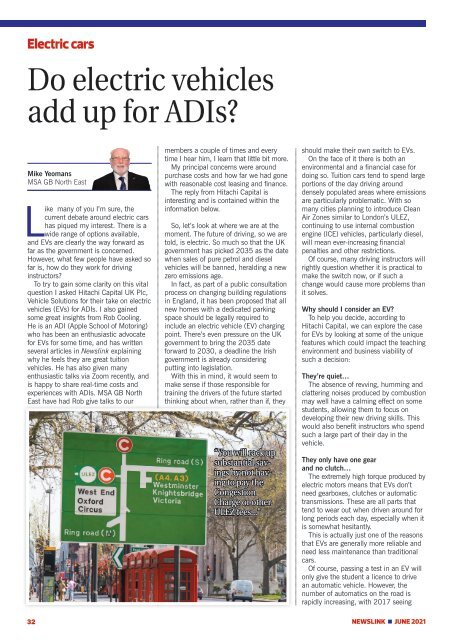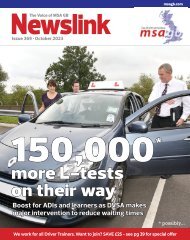Newslink June 2021
Motor Schools Association, driving instructors, road safety, general motoring news
Motor Schools Association, driving instructors, road safety, general motoring news
- No tags were found...
Create successful ePaper yourself
Turn your PDF publications into a flip-book with our unique Google optimized e-Paper software.
Electric cars<br />
Do electric vehicles<br />
add up for ADIs?<br />
Mike Yeomans<br />
MSA GB North East<br />
Like many of you I’m sure, the<br />
current debate around electric cars<br />
has piqued my interest. There is a<br />
wide range of options available,<br />
and EVs are clearly the way forward as<br />
far as the government is concerned.<br />
However, what few people have asked so<br />
far is, how do they work for driving<br />
instructors?<br />
To try to gain some clarity on this vital<br />
question I asked Hitachi Capital UK Plc,<br />
Vehicle Solutions for their take on electric<br />
vehicles (EVs) for ADIs. I also gained<br />
some great insights from Rob Cooling.<br />
He is an ADI (Apple School of Motoring)<br />
who has been an enthusiastic advocate<br />
for EVs for some time, and has written<br />
several articles in <strong>Newslink</strong> explaining<br />
why he feels they are great tuition<br />
vehicles. He has also given many<br />
enthusiastic talks via Zoom recently, and<br />
is happy to share real-time costs and<br />
experiences with ADIs. MSA GB North<br />
East have had Rob give talks to our<br />
members a couple of times and every<br />
time I hear him, I learn that little bit more.<br />
My principal concerns were around<br />
purchase costs and how far we had gone<br />
with reasonable cost leasing and finance.<br />
The reply from Hitachi Capital is<br />
interesting and is contained within the<br />
information below.<br />
So, let’s look at where we are at the<br />
moment. The future of driving, so we are<br />
told, is electric. So much so that the UK<br />
government has picked 2035 as the date<br />
when sales of pure petrol and diesel<br />
vehicles will be banned, heralding a new<br />
zero emissions age.<br />
In fact, as part of a public consultation<br />
process on changing building regulations<br />
in England, it has been proposed that all<br />
new homes with a dedicated parking<br />
space should be legally required to<br />
include an electric vehicle (EV) charging<br />
point. There’s even pressure on the UK<br />
government to bring the 2035 date<br />
forward to 2030, a deadline the Irish<br />
government is already considering<br />
putting into legislation.<br />
With this in mind, it would seem to<br />
make sense if those responsible for<br />
training the drivers of the future started<br />
thinking about when, rather than if, they<br />
“You will rack up<br />
substantial savings<br />
by not hav-<br />
ing to pay the<br />
Congestion<br />
Charge or other<br />
ULEZ fees...”<br />
should make their own switch to EVs.<br />
On the face of it there is both an<br />
environmental and a financial case for<br />
doing so. Tuition cars tend to spend large<br />
portions of the day driving around<br />
densely populated areas where emissions<br />
are particularly problematic. With so<br />
many cities planning to introduce Clean<br />
Air Zones similar to London’s ULEZ,<br />
continuing to use internal combustion<br />
engine (ICE) vehicles, particularly diesel,<br />
will mean ever-increasing financial<br />
penalties and other restrictions.<br />
Of course, many driving instructors will<br />
rightly question whether it is practical to<br />
make the switch now, or if such a<br />
change would cause more problems than<br />
it solves.<br />
Why should I consider an EV?<br />
To help you decide, according to<br />
Hitachi Capital, we can explore the case<br />
for EVs by looking at some of the unique<br />
features which could impact the teaching<br />
environment and business viability of<br />
such a decision:<br />
They’re quiet…<br />
The absence of revving, humming and<br />
clattering noises produced by combustion<br />
may well have a calming effect on some<br />
students, allowing them to focus on<br />
developing their new driving skills. This<br />
would also benefit instructors who spend<br />
such a large part of their day in the<br />
vehicle.<br />
They only have one gear<br />
and no clutch…<br />
The extremely high torque produced by<br />
electric motors means that EVs don’t<br />
need gearboxes, clutches or automatic<br />
transmissions. These are all parts that<br />
tend to wear out when driven around for<br />
long periods each day, especially when it<br />
is somewhat hesitantly.<br />
This is actually just one of the reasons<br />
that EVs are generally more reliable and<br />
need less maintenance than traditional<br />
cars.<br />
Of course, passing a test in an EV will<br />
only give the student a licence to drive<br />
an automatic vehicle. However, the<br />
number of automatics on the road is<br />
rapidly increasing, with 2017 seeing<br />
32<br />
NEWSLINK n JUNE <strong>2021</strong>

















